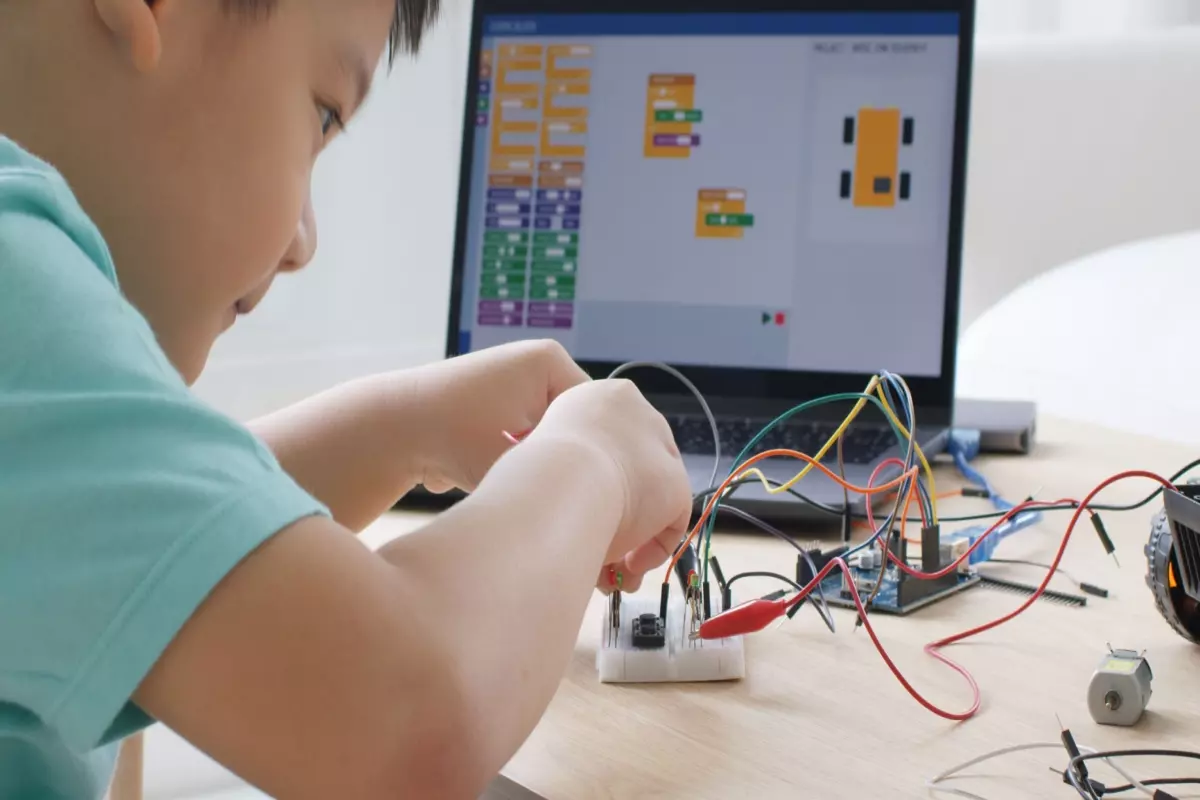The Ethical Challenges of AI in Parenting: Raising Generation Alpha
With technology now a regular part of life, it’s easy to see how AI parenting is starting to change how we parent and educate our kids. Thinking about how these intelligent parenting devices can make things easier and enhance our children’s learning experiences is incredible. In this blog, I’ll walk you through the upsides and the things we should be mindful of when bringing AI into our parenting.
Benefits of AI in Parenting
AI is becoming a more significant part of parenting today, offering tools to simplify life. These technologies have many benefits. Let’s learn more about them.
Enhancing Cognitive Skills, AI Literacy, and Creativity
One of AI’s greatest benefits in parenting is its support for children’s education. In 2019, researchers studied how AI-driven educational tools can help preschool and kindergarten children understand complex subjects like machine learning.

They examined PopBots, a social robot that interacts with kids and makes learning more accessible for young ones. It adjusts to their pace, making the learning process natural and fun. That doesn’t mean teaching basic skills. AI can sharpen a child’s cognitive abilities and give them a head start in understanding how technology works.
In that same study, PopBots were used to introduce kids to fundamental AI concepts, like how machines learn from data or how they can create things on their own. The results were impressive—the children grasped complex ideas you wouldn’t normally expect at such a young age.
In 2021, another group of researchers examined how AI-powered toys like COSMO and Blue Bot are used in early childhood settings. The study found that these toys can significantly boost children’s creativity, inquiry skills, and emotional understanding. These AI toys are designed to engage kids in ways that encourage them to ask questions, explore new ideas, and express their emotions through play. This interactive learning can make traditional education methods more engaging and effective.
Boosting Problem-Solving Skills
When kids play with machine learning systems, they get a hands-on look at how AI learns from data and makes decisions. This early exposure helps them understand technology better and encourages them to think critically and solve problems in a structured way.
In 2020, researchers studied how tools like Google’s Teachable Machine influence young children’s learning. They found that when kids were taught the AI to recognize emotions or gestures, they had to think about how the machine would understand and interpret their actions. This made them break down each step logically, which helped them learn to solve problems more methodically.
By starting young, kids can build a strong foundation in skills that are becoming increasingly valuable, especially in STEM fields. Instead of memorizing facts, they learn how to think, solve problems, and understand the technology shaping their world. It’s about giving them the curiosity and skills they need to succeed as they grow.
Support for Special Needs Education
AI and child development tools are helping make learning more inclusive and accessible for kids with visual, hearing mobility, or intellectual disabilities. A study in the IJIEt highlighted that for students with Autism Spectrum Disorder (ASD), AI-powered robots can teach social skills and help them understand facial expressions and emotions – things that can be challenging.
In the same study, the researchers stated that AI helps students with hearing and visual impairments stay engaged in the classroom. Tools like Microsoft’s Translator can turn spoken words into captions in real-time, which is a massive help for deaf students. For those with visual impairments, AI and augmented reality are being used to create interactive lessons they can fully participate in.
Thanks to AI, students who might otherwise struggle in a traditional classroom get the attention and help they need to succeed.
Streamlining Household Routines with AI
AI monitoring systems are also making life at home more accessible for parents by taking over some of the routine tasks.
According to research, one standout way AI helps is by teaching robots that double as household assistants. These robots can create an engaging learning environment for kids while allowing parents to manage their daily tasks more efficiently, such as calendars or setting reminders for appointments or tasks.

For instance, AI voice-activated robots can play music, assist with language learning, tell stories, or even guide children through drawing activities, keeping them entertained and educated.
This frees up parents’ time so they can focus on other things or simply enjoy more quality moments with their children.
Risks and Ethical Considerations of AI in Raising Children
While AI can make life easier and offer valuable support, it raises concerns beyond convenience. Let’s explore some of the main risks and ethical dilemmas of AI in raising kids.
Privacy Concerns
When AI becomes a part of parenting, it often means collecting and analyzing a lot of data about children. This raises some serious concerns about child privacy and AI. Research from MIT and Boston University shows that AI tools like the Jibo robot and Amazon’s Alexa gather extensive information – everything from a child’s speech patterns to their daily habits. These devices can track interactions, preferences, and even emotions, creating detailed digital profiles of the children who use them.
While this data can help personalize learning experiences, it also opens the door to potential misuse. The idea that these AI parenting tools are storing, analyzing, and sharing this sensitive data with third parties can feel intrusive.
This raises concerns about technology and child safety. If this data were to be exploited, the consequences could be long-lasting, including risks like identity theft or other forms of digital exploitation.
Dependency and Skills Development
As AI in child-rearing becomes a more common part of daily life, there’s a growing concern about kids becoming too dependent on these technologies. While AI can be an excellent tool for learning and creativity, parents should consider how it might impact the development of essential life skills.

The study that looked at AI-powered toys mentions that there’s a risk that kids might rely too much on AI for problem-solving and social interaction. This dependence could prevent children from learning to be resilient and think critically on their own. The convenience of getting instant answers from AI might reduce their ability to think deeply or work through challenges without immediate help.
In addition, while AI robots can teach and play with children, the long-term impact on a child’s ability to build strong, empathetic relationships with peers is still unknown. There’s a worry that kids who spend too much time with AI companions might struggle to develop the social and emotional skills necessary for forming real-life connections.
Bias and Fairness
One of the biggest concerns about using AI in parenting is the risk of these systems reinforcing existing biases. AI-induced bias in education is a real issue since AI learns from data. If that data has biases—like those related to gender, race, or culture—the AI might unintentionally pass these biases on to children through interactions.
This is especially worrying in educational settings where AI is increasingly used to personalize learning. If an AI system favors certain groups or perspectives, it could shape a child’s understanding of the world in a limited and potentially harmful way.
Parental Involvement and Responsibility
AI has undoubtedly made parenting more manageable by taking over some of the routine tasks. Still, this convenience comes with an important question: How much parenting responsibility should we hand over to machines?
While these tools can be helpful, they should always maintain the human touch that is so central in raising children. Parenting is not just about managing schedules or ensuring homework gets done; it’s about nurturing, teaching, and guiding a child through all the ups and downs of growing up.
Socioeconomic Disparities and Access
A significant issue with AI in education is the gap between those with access to advanced technology and those without access. The research mentioned previously also pointed out that children from lower-income families often have different access to AI tools like virtual assistants for kids than their wealthier peers.
This digital divide impacts the quality of education these children receive and reinforces existing inequalities. Kids with better access to AI are more likely to excel in school and later in their careers, while those without it may fall behind, widening the gap between different social groups.
AI and the Future of Parenting Tools
As we look ahead, the focus of AI parenting tools isn’t just on using smarter gadgets but on how these innovations can truly support our children’s growth.
AI Enhanced Learning Experiences
As AI keeps improving, we will witness the rise of parenting tools that offer more than just essential learning support. For instance, AI-powered platforms can turn education into a fun, interactive experience, helping parents support their kids’ learning at home.
One exciting development in this area is the integration of AI with virtual reality (VR) and augmented reality (AR). Imagine using VR at home, where AI guides your child through interactive lessons – like taking a virtual tour of ancient Egypt, exploring the pyramids, and even interacting with historical figures. Or picture an AI-powered science lab that lets children safely mix chemicals and witness reactions, all in a virtual space and outside the traditional classroom setting.
Personalized Parenting Tips
Imagine an AI parenting app offering advice specific to your child’s needs. How? The app analyzes your kid’s daily routine, sleep patterns, and how they interact with intelligent toys. The app could then suggest simple changes to improve their sleep or give tips on helping them with social skills.
Keeping Kids Safe with Smart Tech
AI-powered home security systems can help parents with their kid’s safety and well-being. These systems connect with intelligent gadgets around your house, like cameras and sensors, to monitor your child’s safety. For example, if your toddler gets too close to the stairs, the system could automatically lock the gate or send you an alert. GPS-enabled wearables can track your child’s location outside the house, letting you know if they wander too far. These tools also help you spot any changes in your child’s behavior so you can catch potential health issues early.
Ethical Implications and Strong Guidelines
We must consider their ethical implications as AI parenting tools become more advanced. Strong guidelines should ensure that AI supports, rather than replaces, human parenting. AI systems must be transparent, accountable, and always designed with the child’s best interests in mind.
For instance, the European Union is taking steps to regulate AI through the Artificial Intelligence Act. This Act aims to ensure AI systems are transparent and accountable and respect fundamental rights, such as privacy and non-discrimination, which could impact children’s well-being.
In the U.S., California’s Consumer Privacy Act (CCPA) gives consumers, including parents, the right to know what data is collected about them and their children and how it is used.
Conclusion
AI parenting tools can make life easier for parents, but they should be used to strengthen the parent-child relationship rather than weaken it. The goal is to let AI assist us without losing the personal connections that genuinely matter in raising our kids. AI should be seen as a helper, not a replacement, so parents need to carefully consider how much they rely on technology.
Table of Contents
- Benefits of AI in Parenting
- Enhancing Cognitive Skills, AI Literacy, and Creativity
- Boosting Problem-Solving Skills
- Support for Special Needs Education
- Streamlining Household Routines with AI
- Risks and Ethical Considerations of AI in Raising Children
- Privacy Concerns
- Dependency and Skills Development
- Bias and Fairness
- Parental Involvement and Responsibility
- Socioeconomic Disparities and Access
- AI and the Future of Parenting Tools
- AI Enhanced Learning Experiences
- Personalized Parenting Tips
- Keeping Kids Safe with Smart Tech
- Ethical Implications and Strong Guidelines
- Conclusion



